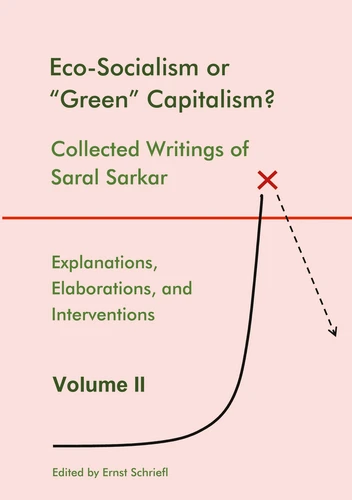Eco - Socialism or "Green" Capitalism?. Collected Writings of Saral Sarkar, Volume 2
Par : ,Formats :
Disponible dans votre compte client Decitre ou Furet du Nord dès validation de votre commande. Le format ePub est :
- Compatible avec une lecture sur My Vivlio (smartphone, tablette, ordinateur)
- Compatible avec une lecture sur liseuses Vivlio
- Pour les liseuses autres que Vivlio, vous devez utiliser le logiciel Adobe Digital Edition. Non compatible avec la lecture sur les liseuses Kindle, Remarkable et Sony
 , qui est-ce ?
, qui est-ce ?Notre partenaire de plateforme de lecture numérique où vous retrouverez l'ensemble de vos ebooks gratuitement
Pour en savoir plus sur nos ebooks, consultez notre aide en ligne ici
- Nombre de pages330
- FormatePub
- ISBN978-3-7583-8524-7
- EAN9783758385247
- Date de parution11/10/2023
- Protection num.Digital Watermarking
- Taille375 Ko
- Infos supplémentairesepub
- ÉditeurBooks on Demand
Résumé
After the ignominious fall of the classical Soviet model of "socialism" in the early 1990s, socialists, communists, and all other kinds of Leftists had felt to have been left in the lurch. With his book Eco-Socialism or Eco-Capitalism? A Critical Analysis of Humanity's Fundamental Choices (1999), Saral Sarkar presented and laid the theoretical foundation of a new conception of socialism, which convinced because it organically synthesized the newly arisen imperative of ecological sustainability and the old ideal of equality among members of humanity.
On their part, all opponents of any kind of socialism have also been trying to somehow accommodate the inexorable insights and demands of true ecological sustainability in extant conceptions of capitalism.
What they have achieved is not a synthesis, but merely a fake and self-contradictory phrase that does not deserve the prefix "Eco-", and should properly be called "Green"-Capitalism. But they succeeded in hoodwinking millions of worried human beings all over the world. In the last thirty years, Sarkar has been relentlessly trying through speeches and writings to counter their misconceptions of the ecological and social imperatives.
In the present two volumes of his Collected Writings, readers will find some of the fruits of his endeavor. Table of Contents, Vol. 2: Ch. 5: On Population Growth and Unwelcome Mass Immigration Ch. 6: On Fascism, Secessionism, Identity Politics and Other "Reactionary" Trends Ch. 7: Futility of Activism Without Analysis Ch. 8: Concluding Essays Table of Contents, Vol. 1: Ch. 1: Polit-autobiographical Essays Ch.
2: Essays on the Renewable Energies Question Ch. 3: The Recent Economic Crises Ch. 4: More on Socialism, Eco-Socialism, Leftism
What they have achieved is not a synthesis, but merely a fake and self-contradictory phrase that does not deserve the prefix "Eco-", and should properly be called "Green"-Capitalism. But they succeeded in hoodwinking millions of worried human beings all over the world. In the last thirty years, Sarkar has been relentlessly trying through speeches and writings to counter their misconceptions of the ecological and social imperatives.
In the present two volumes of his Collected Writings, readers will find some of the fruits of his endeavor. Table of Contents, Vol. 2: Ch. 5: On Population Growth and Unwelcome Mass Immigration Ch. 6: On Fascism, Secessionism, Identity Politics and Other "Reactionary" Trends Ch. 7: Futility of Activism Without Analysis Ch. 8: Concluding Essays Table of Contents, Vol. 1: Ch. 1: Polit-autobiographical Essays Ch.
2: Essays on the Renewable Energies Question Ch. 3: The Recent Economic Crises Ch. 4: More on Socialism, Eco-Socialism, Leftism
After the ignominious fall of the classical Soviet model of "socialism" in the early 1990s, socialists, communists, and all other kinds of Leftists had felt to have been left in the lurch. With his book Eco-Socialism or Eco-Capitalism? A Critical Analysis of Humanity's Fundamental Choices (1999), Saral Sarkar presented and laid the theoretical foundation of a new conception of socialism, which convinced because it organically synthesized the newly arisen imperative of ecological sustainability and the old ideal of equality among members of humanity.
On their part, all opponents of any kind of socialism have also been trying to somehow accommodate the inexorable insights and demands of true ecological sustainability in extant conceptions of capitalism.
What they have achieved is not a synthesis, but merely a fake and self-contradictory phrase that does not deserve the prefix "Eco-", and should properly be called "Green"-Capitalism. But they succeeded in hoodwinking millions of worried human beings all over the world. In the last thirty years, Sarkar has been relentlessly trying through speeches and writings to counter their misconceptions of the ecological and social imperatives.
In the present two volumes of his Collected Writings, readers will find some of the fruits of his endeavor. Table of Contents, Vol. 2: Ch. 5: On Population Growth and Unwelcome Mass Immigration Ch. 6: On Fascism, Secessionism, Identity Politics and Other "Reactionary" Trends Ch. 7: Futility of Activism Without Analysis Ch. 8: Concluding Essays Table of Contents, Vol. 1: Ch. 1: Polit-autobiographical Essays Ch.
2: Essays on the Renewable Energies Question Ch. 3: The Recent Economic Crises Ch. 4: More on Socialism, Eco-Socialism, Leftism
What they have achieved is not a synthesis, but merely a fake and self-contradictory phrase that does not deserve the prefix "Eco-", and should properly be called "Green"-Capitalism. But they succeeded in hoodwinking millions of worried human beings all over the world. In the last thirty years, Sarkar has been relentlessly trying through speeches and writings to counter their misconceptions of the ecological and social imperatives.
In the present two volumes of his Collected Writings, readers will find some of the fruits of his endeavor. Table of Contents, Vol. 2: Ch. 5: On Population Growth and Unwelcome Mass Immigration Ch. 6: On Fascism, Secessionism, Identity Politics and Other "Reactionary" Trends Ch. 7: Futility of Activism Without Analysis Ch. 8: Concluding Essays Table of Contents, Vol. 1: Ch. 1: Polit-autobiographical Essays Ch.
2: Essays on the Renewable Energies Question Ch. 3: The Recent Economic Crises Ch. 4: More on Socialism, Eco-Socialism, Leftism







